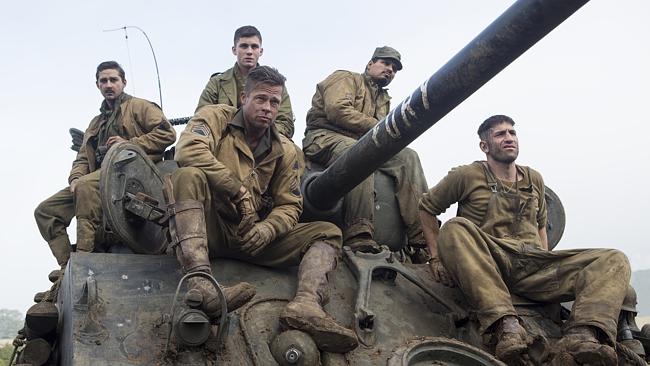Many viewers might be tempted to compare “Fury” to other films in the war genre, but to do so would be to instantly do the film a disservice. “Fury” fails to live up to the character development present in films like “The Thin Red Line” or “Apocalypse Now,” nor does it capture the level of realism on display in “Saving Private Ryan.” To put it bluntly, this David Ayer directed WWII film tells us nothing new about war. What it does do well is explore the horror and sheer brutality that accompanies warfare.
The story begins at the end. WWII is coming to a close yet, for the Americans still entrenched in Nazi-occupied Germany, situations could not be more dire.
Brad Pitt portrays the calloused Don “Wardaddy” Collier, who sports a slick undercut hairstyle and equally groomed nerves and sensibilities. Pitt commands a disparate crew of ruffians comprised of the religious gunner Bible (Shia LaBeouf), the alcoholic driver Gordo (Michael Peña) and the abusive loader Grady (Jon Bernthal).
The chemistry between the crew of the tank Fury is disrupted when the death of their second driver forces them to adopt a new member. This addition is Norman Ellis, a nervous army typist who lacks any real experience in combat. Right off the bat, Norman is tasked to man one of the tank’s machine guns and we watch as he freezes in his first combat situation which results in the death of another tank commander. This unfortunate turn of events, which is exacerbated when Pitt forces a resistant Norman to shoot an unarmed Nazi prisoner, reveals the young typist to be a pacifist or, at the very least, a man with morals.
It is at this point that we realize that, despite being the big name attached to the film, this is not Pitt’s story. Rather, this is the story of Norman and his emotional and mental transformation from inept typist to dependable gunner. Norman fast becomes a student of war, forced to develop by ignoring his conscience in order to preserve the lives of the men around him. And it is the desensitized, insensitive Pitt who becomes the unlikely mentor to Norman, who soon begins to look up to the veteran commander as a father figure.
For the most part the writing is acceptable. The crew’s banter is personal and honest and, at times, darkly humorous. One scene in particular in which Pitt and company, who are looking for food and company, enter the occupied house of two German women, focuses entirely on characterization, revealing the intricacies of the group’s relational dynamic. Unfortunately, the length of this scene is bloated which takes away a lot of the momentum that the film has built up to this point.
Thankfully, the cast is able to step in and carry the film with their convincing performances. Pitt’s acting, as usual, is quite good and the rest of the cast also do respectable jobs. However, and this problem traces back to the writing, the characters are often so one dimensional that the actors aren’t able to do a whole lot to make them memorable or even to make us connect emotionally with them. This becomes problematic as the conflict increases and the film nears its finale.
This finale is a departure from the action we’ve seen up to this point. Drenched in melodrama, the Fury’s final stand reeks of Hollywood clichés, an unrealistic action sequence that doesn’t accomplish much more than entertainment factor.
But just to clarify, I didn’t dislike “Fury.” It proved once again that war is the worst business known to man. Technically speaking, the film isn’t half bad either; fans of the war genre will likely relish the gruesome, large-scale tank battles. No, “Fury” is not necessarily a bad film but it does lack in some aspects. Emotionally, the film falls a little flat and if director Ayer had only devoted a little more time to the story, pacing, and characterization, he might have made a war film that was not only memorable and impactful but one that was necessary.




















It was messed-up and disturbing, but it totally needed to be in order to get its message across in an effective, meaningful manner. Good review Nate.
It was full of bad cop movie dialogue. Technically over exaggerated combat scenes. They take out of the ordinary behavior and make it seems as the normal behavior for average World War 2 soldiers. Every soldier did not utter the f word every time he spoke. They portrayed the average unit as an unruly mob with no accountability or chain of command. It was was as unrealistic in portraying the brutal , prioner killing soldier as the 50s war films were when they portrayed soldiers as totally clean cut choir boys.